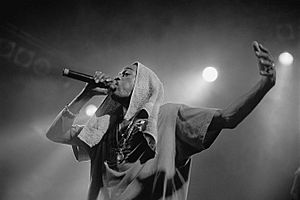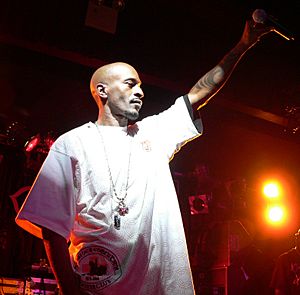Rakim facts for kids
Quick facts for kids
Rakim
|
|
|---|---|

Rakim performing in 2008
|
|
| Background information | |
| Birth name | William Michael Griffin Jr. |
| Also known as |
|
| Born | January 28, 1968 Wyandanch, New York, U.S. |
| Genres |
|
| Occupations |
|
| Labels | |
| Signature | |
 |
|
William Michael Griffin Jr. (born January 28, 1968), known by his stage name Rakim, is a famous American rapper. He is known for being part of the golden age hip-hop duo Eric B. & Rakim. Together, they released four popular albums: Paid in Full (1987), Follow the Leader (1988), Let the Rhythm Hit 'Em (1990), and Don't Sweat the Technique (1992).
As a solo artist, Rakim has released four albums of his own. These include The 18th Letter (1997), The Master (1999), The Seventh Seal (2009), and G.O.D.'s Network: Reb7rth (2024).
Rakim is seen as a rapper who changed hip-hop. Before him, many rappers used simple rhymes and freestyled their lyrics. Rakim was one of the first to sit down and write very detailed lyrics. He used clever word choices, metaphors, and complex rhymes like internal rhymes (rhyming words inside a line) and multisyllabic rhymes (rhyming words with more than one syllable).
Many people say Rakim invented "flow," which is the rhythm and rhyme of a rapper's voice. Rapper Kool Moe Dee said, "We were not even using the word flow until Rakim came along... Rakim created flow!"
In 2006, MTV called Paid in Full the greatest hip-hop album of all time. MTV also ranked Rakim as number 4 on its list of the Greatest MCs of All Time. Steve Huey of AllMusic wrote that "Rakim is near-universally acknowledged as one of the greatest MCs – perhaps the greatest – of all time within the hip-hop community".
Early Life
William Michael Griffin Jr. was born in Wyandanch, New York, on January 28, 1968. His aunt was the famous R&B singer and actress Ruth Brown. Growing up on Long Island, he wrote his first rhyme when he was only seven years old. It was about the cartoon character Mickey Mouse. At first, he wanted to be a professional football player and was the quarterback for his high school team.
Everything changed when his friend introduced him to a local DJ named Eric B. He started writing lyrics for Eric's beats and decided to focus on music. At the time, he was known as Kid Wizard.
In 1986, Rakim joined The Nation of Gods and Earths and chose the name Rakim Allah. This is where his stage name "Rakim" comes from. Because of his amazing skills and his name, he earned the nickname the "God MC."
Career
Working with Eric B. (1985–1992)
Eric B. and Rakim met in 1985 and became one of the most important duos in hip-hop. They released four albums together before they split up in 1992. A journalist for NPR called them "the most influential DJ/MC combo in contemporary pop music period." In 2011, they were nominated for the Rock and Roll Hall of Fame.
1986–1987: A Classic First Album
Eric B. was looking for the best MC in New York, and Rakim answered the call. They recorded their first songs, "Eric B. Is President" and "My Melody," in a home studio. After Russell Simmons, the founder of Def Jam Recordings, heard their music, the duo signed with Island Records.
On July 7, 1987, they released their first album, Paid in Full. The album was a huge success and included five hit singles. It showed the world Rakim's unique rhyming style and Eric B.'s skillful DJing.
1988–1989: Reaching New Heights
The duo's second album, Follow the Leader, was even more successful than their first. It reached number 22 on the U.S. Billboard charts and was certified gold for selling over 500,000 copies.
Released during hip-hop's "golden age," the album received great reviews. On this album, Rakim's lyrics were powerful and his storytelling was sharp. Tracks like "Microphone Fiend" and "Lyrics of Fury" are still considered classics today. This album marked the high point of their work together.
1990–1992: Final Albums and Breakup
In 1990, Eric B. & Rakim released their third album, Let the Rhythm Hit 'Em. On this record, Rakim's voice sounded deeper and more serious. The music was a mix of smooth, soulful songs and hard-hitting tracks. Many fans think this is the duo's most complete album. The Source magazine gave it a perfect "five-mic" rating.
Their fourth and final album, Don't Sweat the Technique, came out in 1992. The song "Know the Ledge" was featured in the movie Juice. However, the duo had business disagreements with their record label, MCA. These problems led to the duo breaking up.
Solo Career (1993–Present)
After splitting with Eric B., Rakim took a break from the spotlight. In 1997, he returned with his first solo album, The 18th Letter. Fans were excited, and the album debuted at number 4 on the Billboard 200 chart.
In 1999, Rakim released his next album, The Master. It received good reviews from critics, but it did not sell as well as his previous work.
From 2000 to 2003, Rakim worked with producer Dr. Dre at Aftermath Entertainment. He was featured on several songs, including the hit "Addictive" by Truth Hurts and a track on the 8 Mile soundtrack. However, Rakim and Dr. Dre had different ideas about the music they should make, so Rakim left the label in 2003.
2007–2009: The Seventh Seal
After a long break, Rakim announced he would release a new album called The Seventh Seal. He explained the title's meaning in an interview with Billboard.
The number 7 has a lot of significance. The seventh letter of the [Supreme] alphabet is G—that stands for God. There are seven continents, seven seas. The Seventh Seal deals with that... for me it's the end of the old and the beginning of the new.
The album was released on November 17, 2009. It was seen as a comeback album after a ten-year gap. It featured singles like "Holy Are You" and "Walk These Streets."
2011–Present: New Music and Reunions
In 2011, Rakim performed the entire Paid in Full album at the Blue Note Jazz Club in New York City for its 25th anniversary. The famous band The Roots played with him.
In 2014, Rakim was featured on the song "Guilty All the Same" by the rock band Linkin Park. This showed how his influence reached beyond hip-hop.
On October 20, 2016, it was announced on Twitter that Eric B. & Rakim had reunited after 23 years apart. They toured together, performing their classic hits for fans around the world.
In 2024, Rakim released his fourth solo album, G.O.D.'s Network: Reb7rth. The album was fully produced by Rakim himself and featured artists like Snoop Dogg and Nipsey Hussle. On May 21, 2025, Rakim received the George Peabody Medal for his amazing contributions to music.
Artistry and Style
Rakim's rhyming style was very different from what came before. He didn't always follow the beat perfectly, which made his flow sound more like a jazz instrument. Ben Ratliff of The New York Times said Rakim's rapping was more advanced than the simple "schoolyard rhymes" of early hip-hop.
While other rappers like LL Cool J and Run-D.M.C. were known for their high-energy performances, Rakim had a calm and relaxed delivery. MTV said, "He had a slow flow, and every line was blunt, mesmeric." This cool, confident style came from his love of jazz music. He even played the saxophone and was a fan of John Coltrane.
Kool Moe Dee credits Rakim with changing how rappers thought about their rhymes. He said that after 1986, every new rapper had to study Rakim to learn about flow. Rakim's lyrics often talked about his skills as a rapper and his Islamic faith. His clever wordplay and smooth delivery made him a master of the craft.
Legacy
Rakim's work with Eric B., especially the album Paid in Full, created a new blueprint for hip-hop. His advanced lyrical style helped make East Coast hip hop famous for its creativity. Many writers and critics say that Rakim's rapping was a huge leap forward for the genre.
Rolling Stone magazine ranked Paid in Full at number 227 on its list of "The 500 Greatest Albums of All Time." Time magazine also included it in its list of the 100 most important albums ever made.
Rakim's influence can be heard in the music of many of the greatest rappers who came after him. Artists like Nas, Jay-Z, Eminem, The Notorious B.I.G., and members of the Wu-Tang Clan have all said that Rakim inspired them. He truly changed the art of being an MC.
Discography
Studio albums
Solo
- The 18th Letter (1997)
- The Master (1999)
- The Seventh Seal (2009)
- G.O.D.'s Network: Reb7rth (2024)
With Eric B. & Rakim
- Paid in Full (1987)
- Follow the Leader (1988)
- Let the Rhythm Hit 'Em (1990)
- Don't Sweat the Technique (1992)
Images for kids
See also
 In Spanish: Rakim para niños
In Spanish: Rakim para niños
 | James Van Der Zee |
 | Alma Thomas |
 | Ellis Wilson |
 | Margaret Taylor-Burroughs |




